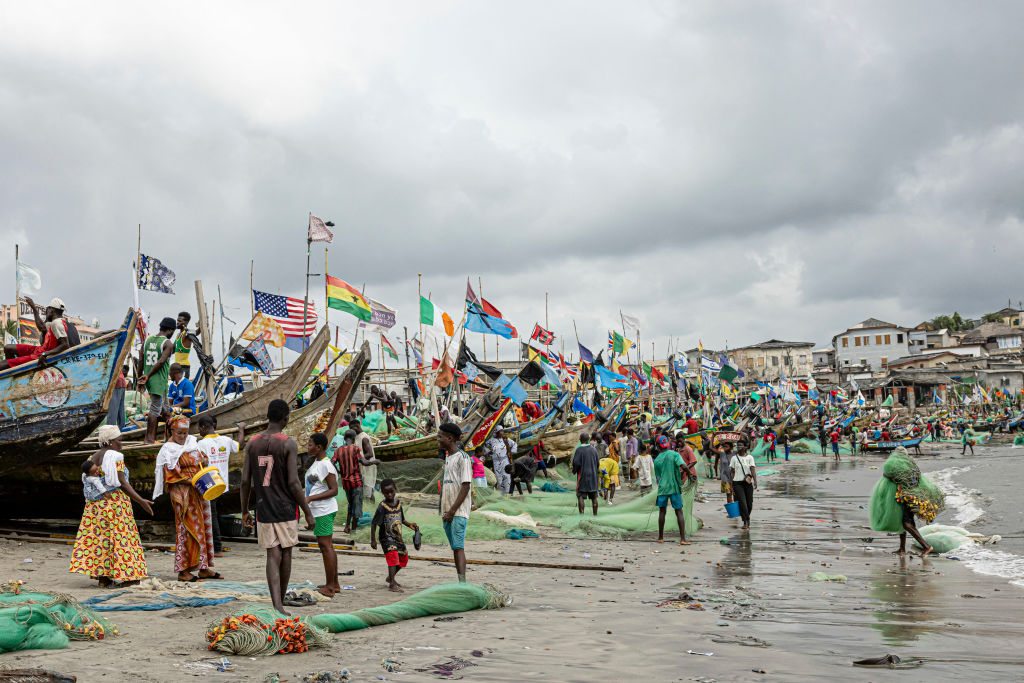Ghana’s fisheries sector directly and indirectly employs about 2.2 million people who process, sell, transport, wash and descale fish. However, 90% of Ghanaians surveyed by Harvard researchers said they do not believe their children will be able to depend on fishing or related trades in the future. Similar sentiments were expressed in Côte d’Ivoire and Nigeria.
This is mainly because Ghana and other West African nations have for decades been victimized by industrial fishing trawlers, many from China, which engage in a variety of illegal, unreported and unregulated (IUU) fishing. China is the world’s worst illegal fishing offender, according to the IUU Fishing Risk Index. Of the top 10 companies engaged in illegal fishing globally, eight are from China.
In Côte d’Ivoire and Ghana, illegal practices such as bottom trawling, fishing in areas designated for artisanal fishermen, fishing with explosives and using improper gear are threatening the survival of small pelagic fish. Ghana’s total catch of these fish dropped by 59% between 1993 and 2019. The decline in Côte d’Ivoire was nearly 40% from 2003 to 2020, the Harvard report said.
“We have a big issue with IUU,” Isaac Okyere, a researcher from Ghana’s University of Cape Coast, told Mongabay. “There are instances where the vessels have two different gears: one is licensed and one is not licensed — with that they catch pelagic fish. It is a booming business.”
More than 100,000 fishermen and 11,000 canoes operate in Ghana, but average annual income has dropped by as much as 40% per artisanal canoe in the past 15 years or so, according to the Environmental Justice Foundation (EJF). Decimated fish stocks around West Africa cause prices to soar and drive food insecurity.
About 2.4 million Ghanaians are vulnerable to food insecurity, while 18% of Côte d’Ivoire’s population of nearly 31.2 million faces acute food insecurity. During this year’s lean season between June and August, 30.6 million Nigerians are projected to face acute food insecurity.
Besides IUU fishing, warmer Gulf of Guinea waters also drive fish to migrate away from the coast. Because fish are cold-blooded, they swim deeper or migrate farther to regulate their body temperature. The sun warms the waters through solar radiation absorption, a process in which a material captures incoming solar radiation and converts it into another form of energy, typically heat. Wind and wave patterns also influence heat distribution in the water.
As sea surface temperatures have increased in West Africa, small pelagic fish populations have migrated significantly. According to the Harvard report, the range of sardinella aurita, commonly targeted by artisanal fishermen, have moved 181 kilometers per decade since 1995.
To preserve fisheries and combat IUU fishing, Côte d’Ivoire and Ghana have imposed closed fishing seasons for artisanal canoes and industrial trawlers to prevent fish from being caught during the peak summer spawning months.
Ghana first adopted this practice in a limited form in 2016 by declaring a brief closed season for trawlers during the fish spawning month of July. Côte d’Ivoire followed by announcing annual “biological rest periods” within that country’s fishing zones.
However, the results were disappointing, according to the Harvard researchers. The average catch rates of round sardinella per canoe trip in Ghana actually declined after the closed season in 2023. In Ghana, the closed seasons were unpopular with local fishermen, who believed the government imposed the ban to create more room in the market to sell imported frozen fish.
“They also wanted government bans to focus on illegal fishing by Chinese trawlers and not on local boats,” the Harvard report said.
According to the EJF, more than 90% of industrial trawlers in Ghanaian waters are linked to Chinese owners who depend on Ghanaian front companies to dodge national laws that forbid their operation. Throughout West Africa, Chinese bottom trawlers catch an estimated 2.35 million tons of fish per year, accounting for 50% of China’s total distant water catch and worth about $5 billion, the EJF reported.
In response to persistent violations by industrial trawlers in Ghana’s inshore exclusion zone (IEZ), Emelia Arthur, Ghana’s newly appointed fisheries minister, in June announced plans to expand the area in which artisanal fishermen can operate in the IEZ. This area now will extend from 6 nautical miles (11 kilometers) to 12 nautical miles (22 kilometers). Ghana’s Parliament must approve the new rule, but Arthur said legal reforms are underway.
“We are then going to enforce that regulation so severely that semi-industrial vessels and industrial vessels are not going to be permitted to operate in this zone,” Arthur said in a report by Mongabay.

